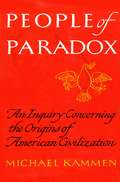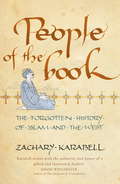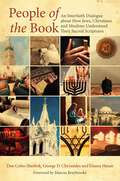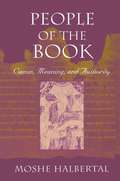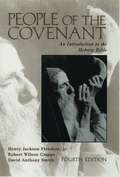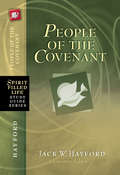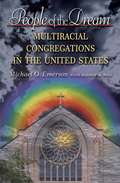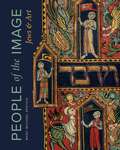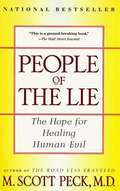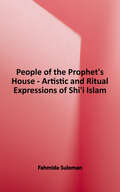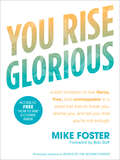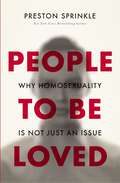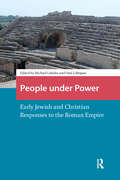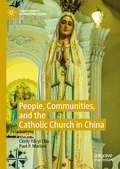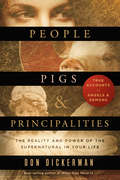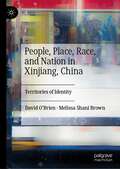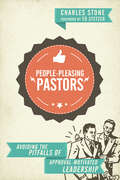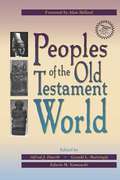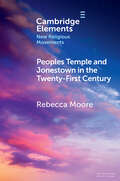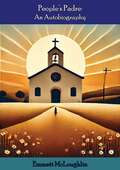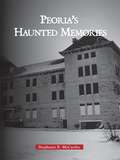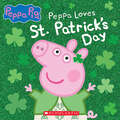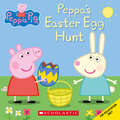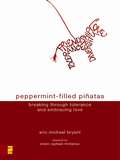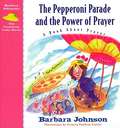- Table View
- List View
People of Paradox: An Inquiry Concerning the Origins of American Civilization
by Michael KammenFrom the beginning, what has given our culture its distinctive texture, pattern, and thrust, according to Michael Kammen, is the dynamic interaction of the imported and the indigenous. He shows how, during the years of colonization, some ideas and institutions were transferred virtually intact from Britain, while, simultaneously, others were being transformed in the New World. As he unravels the tangled origins of our culture, he makes us see that unresolved contradictions in the American experience have created our national style. Puritanical and hedonistic, idealistic and materialistic, peace-loving and war-mongering: these opposing strands go back to the genesis of our history.<P><P> Pulitzer Prize Winner
People of the Book
by Zachary KarabellWe live in a world polarized by the ongoing conflict between Muslims, Christians and Jews, but - in an extraordinary narrative spanning fourteen centuries - Zachary Karabell argues that the relationship between Islam and the West has never been simply one of animosity and competition, but has also comprised long periods of cooperation and coexistence. Through a rich tapestry of stories and a compelling cast of characters, People of the Book uncovers known history, and forgotten history, as Karabell takes the reader on an extraordinary journey through the Arab and Ottoman empires, the Crusades and the Catholic Reconquista and into the modern era, as he examines the vibrant examples of discord and concord that have existed between these monotheistic faiths. By historical standards, today's fissure between Islam and the West is not exceptional, but because of weapons of mass destruction, that fissure has the potential to undo us more than ever before. This is reason enough to look back and remember that Christians, Jews and Muslims have lived constructively with one another. They have fought and taught each other, and they have learned from one another. Retrieving this forgotten history is a vital ingredient to a more stable, secure world.
People of the Book: An Interfaith Dialogue about How Jews, Christians and Muslims Understand Their Sacred Scriptures
by Dan Cohn-Sherbok George Chryssides Usama Hasan Marcus BraybrookeWhat is the role of scripture in illuminating the lives of the faithful today? In this book, three experts in Judaism, Christianity and Islam respectively discuss and debate this question, by exploring the core messages of the Torah, Bible and Qu'ran. Taking a deeper look at the wide range of theological, political and social issues that divide (and sometimes unite) their religions, they reveal how inspiration and guidance can be drawn not only on life's big questions such as sin and the afterlife, but also on societal issues including war, suffering, marriage and justice.
People of the Book: Canon, Meaning, and Authority
by Moshe HalbertalHalbertal provides a panoramic survey of Jewish attitudes toward Scripture, provocatively organized around problems of normative and formative authority, with an emphasis on the changing status and functions of Mishnah, Talmud, and Kabbalah.
People of the Covenant: An Introduction to the Hebrew Bible
by Henry Jackson Flanders Robert Wilson Crapps David Anthony SmithFully revised and updated using contemporary literary approaches and the most recent historical scholarship, this introduction to the Hebrew Bible provides a thorough and coherent approach to the basic human issues of the Scriptures. It emphasizes the meanings that the Hebrews gave to persons and events in their attempts to manage life's struggles, and provides textual aids that help students understand these ideas and apply them to contemporary issues. After an initial presentation on the nature of biblical literature, the Book of Genesis is treated as a theological prelude to Israel's story. Subsequent chapters are organized around epochs in Hebrew life. Throughout the book the authors stress the human issues at stake in Israel's memory and the preservation of its history, and how circumstances and thought influenced the Hebrew perceptions and understanding of God. <p><p> Accessible and stimulating to students of the Hebrew Bible with a wide range of academic and religious backgrounds, People of the Covenant is grounded in the best scholarly methodologies, respect for the rich literary values of the Hebrew Bible, and concern for its enduring religious relevance.
People of the Covenant: God's New Covenant for Today (Spirit-Filled Life Study Guide Series)
by Jack HayfordUnderstand how God's promises are relevant today. From the garden of Eden to the garden in heaven's paradise, the blood of sacrifice is the constant testimony of God's grace. Learn about the covenants between God and His people, and how those covenants are promises of power and holiness for the believer. As part of the Spirit-Filled Life Study Guide Series, People of the Covenant offers a clearer understanding of what God's promises mean and how trusting Him can transform lives.The Spirit-Filled Life® study guides are perfect companions to the New Spirit-Filled Life Study Bible or for use on their own. Their interactive approach offers an in-depth look at practical living in God's kingdom and challenges users to examine and live their daily lives in light of God's Word.Features include:12 lessons, plus an introduction to experiencing the hope and purpose that come with living with God's covenants in viewFoundational, practical helps like Kingdom Extras, Probing the Depths, and Word Wealth in each lesson
People of the Dream: Multiracial Congregations in the United States
by Michael O. EmersonIt is sometimes said that the most segregated time of the week in the United States is Sunday morning. Even as workplaces and public institutions such as the military have become racially integrated, racial separation in Christian religious congregations is the norm. And yet some congregations remain stubbornly, racially mixed. People of the Dream is the most complete study of this phenomenon ever undertaken. Author Michael Emerson explores such questions as: how do racially mixed congregations come together? How are they sustained? Who attends them, how did they get there, and what are their experiences? Engagingly written, the book enters the worlds of these congregations through national surveys and in-depth studies of those attending racially mixed churches. Data for the book was collected over seven years by the author and his research team. It includes more than 2,500 telephone interviews, hundreds of written surveys, and extensive visits to mixed-race congregations throughout the United States. People of the Dream argues that multiracial congregations are bridge organizations that gather and facilitate cross-racial friendships, disproportionately housing people who have substantially more racially diverse social networks than do other Americans. The book concludes that multiracial congregations and the people in them may be harbingers of racial change to come in the United States.
People of the Image: Jews and Art (Dimyonot)
by Marc Michael EpsteinThe Middle Ages provide us with one of the richest repositories of art in the West. Yet the rise in the production of art made for and by Jews—especially in the form of illuminated manuscripts—is often neglected in general surveys or viewed as a mere emulation of Christian art during this period.In People of the Image, Marc Michael Epstein demonstrates how medieval Jews transformed their visual art into a vital site of critical commentary. Through bold speculation and radical interpretation, Epstein considers how viewers might have empathized with depicted emotions, how they envisioned the relationship between the monstrous and the human, and how they could effectively perpetrate subversive acts merely by anticipating what might occur next in a given image were it to be set in motion. Examining these artworks and imagining the circumstances of their production and reception, Epstein uncovers otherwise inaccessible social, political, and theological perceptions among Europe’s major medieval minority. He goes on to illuminate the afterlives of medieval Jewish art in its reimaginings by postmodern Jews struggling to establish a conceptual as well as a political space for themselves as a minority in majority Christian society.Bringing together diverse currents from various fields and bodies of literature, People of the Image reveals how medieval Jews understood themselves, the world, and God. Provocative and engagingly written, the book will appeal to audiences across medieval studies, cultural studies, art history, and Jewish studies.
People of the Lie: The Hope for Healing Human Evil
by M. Scott Peck<p>In this absorbing and equally inspiring companion volume to his classic trilogy—The Road Less Traveled, Further Along the Road Less Traveled, and The Road Less Traveled and Beyond—Dr. M. Scott Peck brilliantly probes into the essence of human evil. <p>People who are evil attack others instead of facing their own failures. Peck demonstrates the havoc these people of the lie work in the lives of those around them. He presents, from vivid incidents encountered in his psychiatric practice, examples of evil in everyday life. <p>This book is by turns disturbing, fascinating, and altogether impossible to put down as it offers a strikingly original approach to the age-old problem of human evil.</p>
People of the Prophet's House: Artistic and Ritual Expressions of Shi'i Islam
by Fahmida SulemanDespite their distinct theological differences, Shi'a and Sunni Muslims, followers of the two main branches of Islam, share a number of core beliefs, including an allegiance to and love for the Prophet Muhammad and members of his family. For Shi'a Muslims, reverence for the Prophet and allegiance to his household (Ahl al-bayt, 'People of the House'), comprising his immediate family and their descendants, constitutes an essential principle of belief that has directly impacted how Shi'i artists, rulers, patrons and ritual participants have conveyed their love and loyalty through material culture and religious ritual. The 22 essays in this volume, richly illustrated with over 200 colored images, present a diversity of beliefs and practices expressed through the arts, architecture, material culture and ritual that spans Shi'i history from the tenth century to the present day. With contributions from experts in the fields of anthropology, religious studies, art and architectural history, numismatics, film studies and contemporary art, the book also calls attention to the global diversity of the artistic and devotional expressions of Shi'a Muslims from across Trinidad, Senegal, Egypt, Syria, Iraq, Iran, Pakistan, India and China. Additionally, some essays draw upon important female Shi'i figures and female ritual practices, and many chapters underscore the theme of love for the Ahl al-bayt beyond Sunni and Shi'i demarcations. This work contributes to a growing body of scholarship dedicated to the religious arts and rituals of Shi'a Muslims around the world.
People of the Second Chance: A Wild Invitation to Live Fierce, Free, and Unstoppable in a World that Tries to Break You, Shame You, and Tell You that You're Not Enough
by Bob Goff Mike FosterA Manifesto for Prodigals, Imperfectionists, and HopestersWhat if I told you that you and your not-so-perfect story have been invited to experience the joy of second chance living. Your critics and nay-sayers, and those negative voices in your head have defined who you are and stolen your hopeful future for far too long! The insecurity, shame, and judgment--That. Stops. Today. This simple guide will show you how your imperfect life matters in ways you never thought possible. It will help you see your scars, flaws, and failures as unfair advantages and gifts that you can bring to the world. Packed full of unfiltered honesty and simple next steps, this book will help you discover beauty in the brokenness.
People to Be Loved: Why Homosexuality Is Not Just an Issue
by Preston Sprinkle Wesley HillChristians who are confused by the homosexuality debate raging in the US are looking for resources that are based solidly on a deep study of what Scripture says about the issue. In People to Be Loved, Preston Sprinkle challenges those on all sides of the debate to consider what the Bible says and how we should approach the topic of homosexuality in light of it. In a manner that appeals to a scholarly and lay-audience alike, Preston takes on difficult questions such as how should the church treat people struggling with same-sex attraction? Is same-sex attraction a product of biological or societal factors or both? How should the church think about larger cultural issues, such as gay marriage, gay pride, and whether intolerance over LGBT amounts to racism? How (or if) Christians should do business with LGBT persons and supportive companies? Simply saying that the Bible condemns homosexuality is not accurate, nor is it enough to end the debate. Those holding a traditional view still struggle to reconcile the Bible’s prohibition of same-sex attraction with the message of radical, unconditional grace. This book meets that need.
People under Power: Early Jewish and Christian Responses to the Roman Empire (Early Christianity in the Roman World)
by Michael Labahn Outi LehtipuuThis volume presents a batch of incisive new essays on the relationship between Roman imperial power and ideology and Christian and Jewish life and thought within the empire. Employing diverse methodologies that include historical criticism, rhetorical criticism, postcolonial criticism, and social historical studies, the contributors offer fresh perspectives on a question that is crucial for our understanding not only of the late Roman Empire, but also of the growth and change of Christianity and Judaism in the imperial period.
People, Communities, and the Catholic Church in China (Christianity in Modern China)
by Cindy Yik-yi Chu Paul P. MarianiThis book explores the Chinese Catholic Church as a whole as well as focusing on particular aspects of its activities, including diplomacy, politics, leadership, pilgrimage, youths, and non-Chinese Catholics in China. It discusses Sino-Vatican relations and the rationale behind the decisions taken by Pope Francis with regard to the appointment of bishops in China. The book also examines important changes and personalities in the Chinese Church, the Catholic organizations, and the Catholic communities in the Church, offering a key read for researchers and graduate students studying the Chinese Catholic Church, the Church in Asia, and religion in contemporary China.
People, Pigs, and Principalities: The Reality and Power of the Supernatural in Your Life
by Don DickermanAngels and demons are operating all around you. Whether you believe it or not. Whether you can see them or not. In fact, the Bible tells us there is a battle going on. Demonic powers are at war against God’s children, opposing the work of God. Angels, as part of their creative purpose, minister for God’s people. They are on our side. In People, Pigs, and Principalities Don Dickerman gives you insightful teachings and testimonies about this spirit realm and how it intersects with your everyday life. With powerful true stories—including the inspirational story of his youngest son’s contact with angels at the age of seven—Dickerman combines the miraculous events in his own life with support from scripture to empower you to successfully comprehend the spirit world and win your spiritual battles. Whether you realize it or not, every day you are involved in the activity of angels, demons, and the spirit realm. The true stories in this book will amaze and inspire you to explore God’s supernatural world for yourself.
People, Place, Race, and Nation in Xinjiang, China: Territories of Identity
by David O’Brien Melissa Shani BrownIn one of the only works drawing on interviews with both Uyghurs and Han in Xinjiang, China, and postcolonial perspectives on ethnicity, nation, and race, this book explores how forms of banal racism underpin ideas of self and other, assimilation and modernisation, in this restive region. Significant international attention has condemned the CCP’s use of forced internment in ‘re-education’ camps, as well as its campaign of cultural assimilation. In this wider context, this book focuses upon the ways in which ethnic difference is writ through the banalities of everyday life: who one trusts, what one eats, where one shops, even what time one’s clocks are set to (Xinjiang being perhaps one of the only places where different ethnic groups live by different time-zones).Alongside chapters focusing upon the coercive ‘re-education’ campaign, and the devastating Ürümchi Riots in 2009, this book also unpacks how discourses of Chinese nationalism romanticise empire and promote racialised ways of thinking about Chineseness, how cultural assimilation (‘Sinicisation’) is being justified through the rhetoric of ‘modernisation’, how Islamic sites and Uyghur culture are being secularised and commodified for tourist consumption. We also explore Uyghur and Han perspectives, including of each other, giving insight into the diversity of opinions within both groups.Based on many years of living and working in China, and fieldwork and interviews specifically in Xinjiang, this book will be valuable to a variety of readers interested in the region and Uyghur and Han identity, ethnic/national identities in contemporary China, and racisms in non-western contexts.
People-Pleasing Pastors: Avoiding the Pitfalls of Approval-Motivated Leadership
by Charles StoneOutreachPastors and church leaders often fall into the trap of people-pleasing. Charles Stone?s research on thousands of pastors and ministry leaders demonstrates the dangers of approval-motivated leadership. Bringing together biblical insights and neuroscience findings, Stone shows why we fall into people-pleasing patterns and what we can do to overcome these tendencies. With practical tools for individuals and teams, Stone offers concrete resources to help you and your leadership minimize people-pleasing and have more effective ministry.
Peoples Of The Old Testament World
by Alfred Hoerth Gerald Mattingly Edwin Yamauchi Alan MillardDetailed historical and archaeological essays give insight into the many people groups who interacted with and influenced ancient Israel.
Peoples Temple and Jonestown in the Twenty-First Century (Elements in New Religious Movements)
by Rebecca MooreThe new religious movement of Peoples Temple, begun in the 1950s, came to a dramatic end with the mass murders and suicides that occurred in Jonestown, Guyana, in 1978. This analysis presents the historical context for understanding the Temple by focusing on the ways that migrations from Indiana to California and finally to the Cooperative Republic of Guyana shaped the life and thought of Temple members. It closely examines the religious beliefs, political philosophies, and economic commitments held by the group, and it shifts the traditional focus on the leader and founder, Jim Jones, to the individuals who made up the heart and soul of the movement. It also investigates the paradoxical role that race and racism played throughout the life of the Temple. The Element concludes by considering the ways in which Peoples Temple and the tragedy at Jonestown have entered the popular imagination and captured international attention.
People’s Padre: An Autobiography
by Emmett McLoughlinPeople’s Padre: An Autobiography by Emmett McLoughlin is a powerful and candid memoir of a man who broke barriers, defied expectations, and dedicated his life to serving others. Born into a devout Catholic family, McLoughlin became a Franciscan priest, but his unwavering commitment to addressing the needs of the poor and marginalized ultimately led him to leave the priesthood and forge a new path.In this deeply personal account, McLoughlin reflects on his journey, from his early years of faith and devotion to his groundbreaking work as a priest in Phoenix, Arizona. There, he established the city’s first interracial hospital, St. Monica’s, and fought tirelessly for better healthcare and social justice for the underprivileged. However, his challenges with the church hierarchy, which resisted some of his progressive efforts, culminated in his decision to leave the priesthood in 1948—a choice that shocked many and shaped his legacy.With honesty and passion, McLoughlin recounts his struggles, triumphs, and unwavering faith in humanity. His story is one of courage, compassion, and a relentless pursuit of justice, making People’s Padre an inspiring testament to the power of individuals to make a difference in the lives of others.This memoir offers readers a unique perspective on the intersection of religion, social activism, and personal conviction. It is an enduring tribute to the human spirit and a call to action for those who seek to serve others, regardless of the obstacles they may face.
Peoria's Haunted Memories
by Stephanie E. MccarthyAt the heart of Peoria's Haunted Memories is the rich and compelling history and folklore of the Peoria area. Buildings and cemeteries in and around the city provide ideal stomping grounds for many restless specters. In this collection of haunted sites, the reader will be introduced to some of Peoria's best-loved mansions, institutions, and graveyards, as well as many of its more illustrious citizens. From Bartonville State Hospital to Bradley University, historic downtown theaters, hotels and taverns, and local churches, where ghostly congregants and ministers continue to worship, this book presents these ghost stories and legends for the fi rst time together in print. In addition to providing thrilling tales, Peoria's Haunted Memories serves as a unique guide for the intrepid supernatural sleuth seeking confi rmation that the dead do not always rest in peace.
Peppa Pig: Peppa Loves St. Patrick's Day
by ScholasticPeppa learns about and celebrates St. Patrick's Day in this original 8x8 storybool. Includes a special fact sheet in the back. Based on the hit show on Nick Jr.Peppa and George are going to Ireland for an Irish-dancing festival!But when the band forget their instruments, will Peppa's new Irish four-leaf clover be able to bring them some luck?This brand-new story features a glittery cover and is the perfect introduction to Ireland and St. Patrick's Day for little Peppa fans.
Peppa's Easter Egg Hunt (Peppa Pig)
by ScholasticPeppa and her friends go on an Easter egg hunt adventure!It's springtime, and Grandpa Pig has set up an Easter egg hunt for Peppa Pig and her friends! Join Peppa, Rebecca Rabbit, and Freddy Fox as they search for delicious chocolate eggs and even see baby chicks hatching in the yard!
Peppermint-Filled Piñatas
by Eric Michael BryantWe live in a diverse world filled with unprecedented opportunity. There is a call to move past the barriers that stand between us and those who may be different. Eric Michael Bryant has seen tolerance shown to those who are different than us—racially, religiously, sexually, politically, economically—and believes there must be more. After all, Jesus didn’t just tolerate people; he embraced them all with love. Using lighthearted humor, engaging personal stories, and a “party theology,” Bryant shows us how to love our neighbors and fulfill the vision Jesus had for the church from the beginning. Whether that is through building relationships with the help of bounce houses, stand up comedy, or piñatas, followers of Christ will be inspired to actively engage the world around them.
Pepperoni Parade
by Barbara JohnsonWhen Sarah becomes lost at a large parade, she and her friends learn the importance of praying for God's help.
